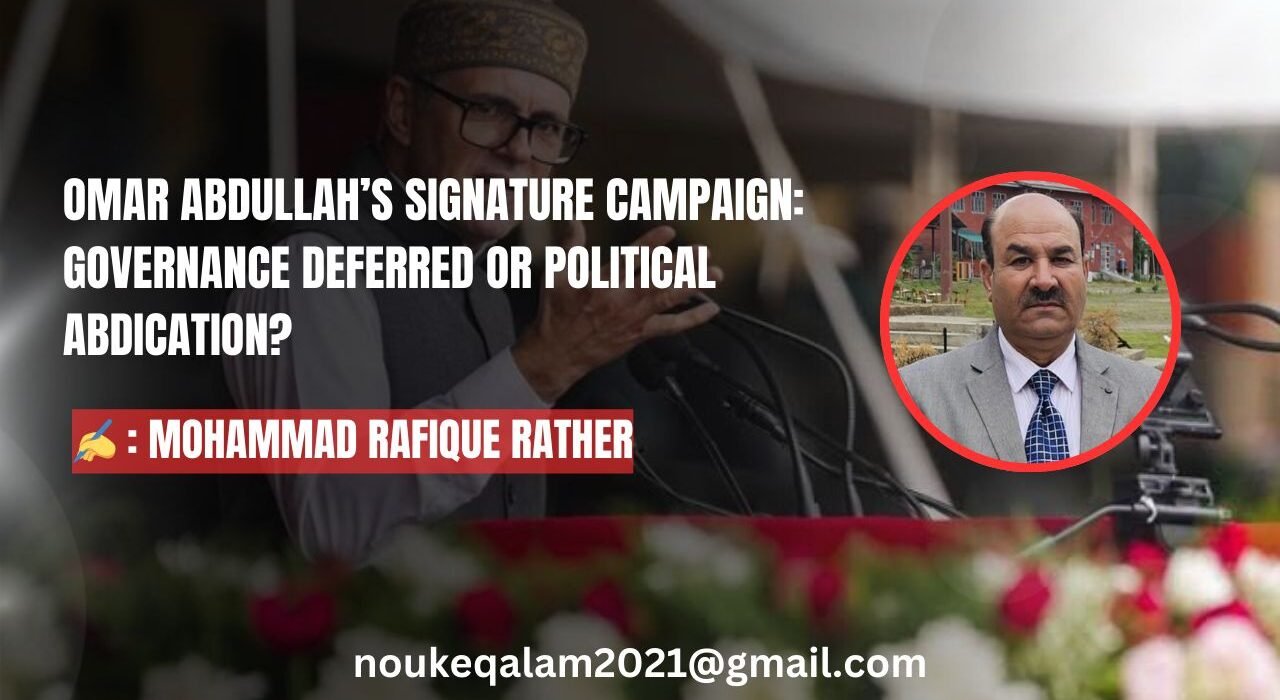✒️:. Mohd Rafique Rather
Nine months after a decisive mandate, the Chief Minister turns to petitions instead of performance.
On this Independence Day, the Chief Minister of Jammu and Kashmir, Mr. Omar Abdullah, delivered a speech heavy on symbolism but light on responsibility. He spoke of “dual control” in Jammu and Kashmir, criticised the Supreme Court for delaying the statehood petition, and announced a door-to-door signature campaign to demand its restoration. He even likened his government to a horse with its front legs tied. While the metaphor might capture headlines, it also raises troubling questions about political will and the use—or misuse—of a public mandate.
Only nine months ago, Omar Abdullah received a decisive mandate from the people of Jammu and Kashmir. The electorate, fully aware that elections were being held under a Union Territory framework, still placed its trust in his leadership. That mandate was not a symbolic gesture—it was an instruction to govern, to deliver services, and to stand by the promises made during the campaign. The mandate was sought on the basis of the election manifesto, but most importantly on the promise of fighting for the restoration of Jammu and Kashmir’s special status under Articles 370 and 35A. Now, reducing this claim to a mere demand for statehood is, in effect, an attempt to normalise what happened on 5th August 2019.
Today, instead of decisive governance, the people are told the government’s hands are tied. If that is truly the case, why did Omar Abdullah contest in the first place? And if statehood is indeed the top priority, why hasn’t the Assembly been used to pass a strong, unanimous resolution demanding it?
Before the elections, Omar Abdullah declared that he would not fight in a system where even the transfer of a Class IV employee required the Lieutenant Governor’s nod. Yet he later not only entered the race but contested from two seats, fully aware of the limitations he now cites as an excuse. The people overlooked this U-turn, trusting that he would still find ways to work within the system to produce results. Today, invoking those same limitations sounds less like principled resistance and more like political convenience.
Restoring statehood is unquestionably a just and urgent demand. But it should not become a shield to deflect attention from unfulfilled promises. Even within the UT framework, there is plenty that an elected government can do—addressing unemployment, improving healthcare and education, fixing basic civic infrastructure, and providing relief to farmers, traders, and daily wage earners. These tasks require not constitutional change but political will. Yet when governance fails, the statehood issue is raised as the universal alibi. Meanwhile, the privileges of office—protocols, perks, and political power—are enjoyed without hesitation.
A signature campaign is a tool of activism and opposition politics, not the primary instrument of a sitting Chief Minister who enjoys a legislative majority. Far more powerful tools are available: passing a unanimous resolution in the Assembly, leading an all-party delegation to Delhi with a united demand, and using political leverage to compel the Centre to respond. While the Chief Minister seeks signatures from the public, the public is waiting for signatures from his office—on employment orders, on development files, on welfare schemes. The irony writes itself.
The people of Jammu and Kashmir have faced decades of political upheaval and broken promises. Their decision to vote in large numbers despite these challenges is a clear act of faith in the democratic process. That faith demands action, not helplessness. Independence Day speeches should inspire confidence, not resignation. By admitting that his “horse’s front legs are tied,” Omar Abdullah has sent a message of political surrender rather than determination. True leadership is about navigating constraints while fighting to remove them—showing through performance that even a tied horse can still move forward.
There is a way to fight for statehood without pausing governance. A responsible government could pass and forward a statehood resolution to the President and Prime Minister, implement high-impact projects that don’t require LG approval, keep constant public and media pressure on Delhi, and mobilise a broad-based political consensus in and outside J&K. The fight for statehood must continue, but it cannot be used as an escape route from governance obligations.
Nine months into his tenure, Omar Abdullah faces a clear choice: be remembered as the leader who fought for statehood while governing effectively, or as one who, despite a historic mandate, retreated into symbolic campaigns and political surrender. The people of J&K have spoken once through the ballot box. They will speak again on performance. And when they do, petitions may not carry as much weight as results.
The author is a former trade union leader, columnist, and TV debater. He can be reached at mrafiqr65@gmail.com





